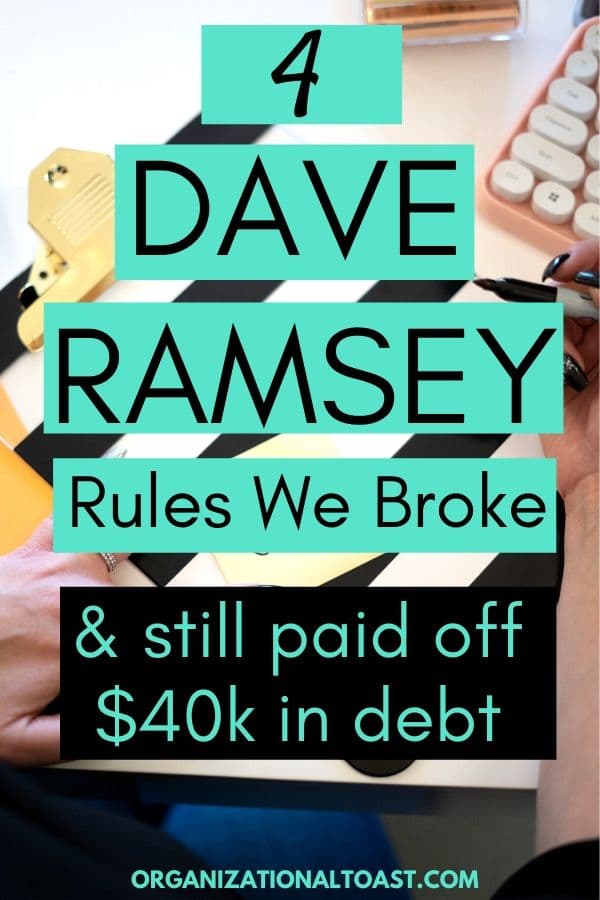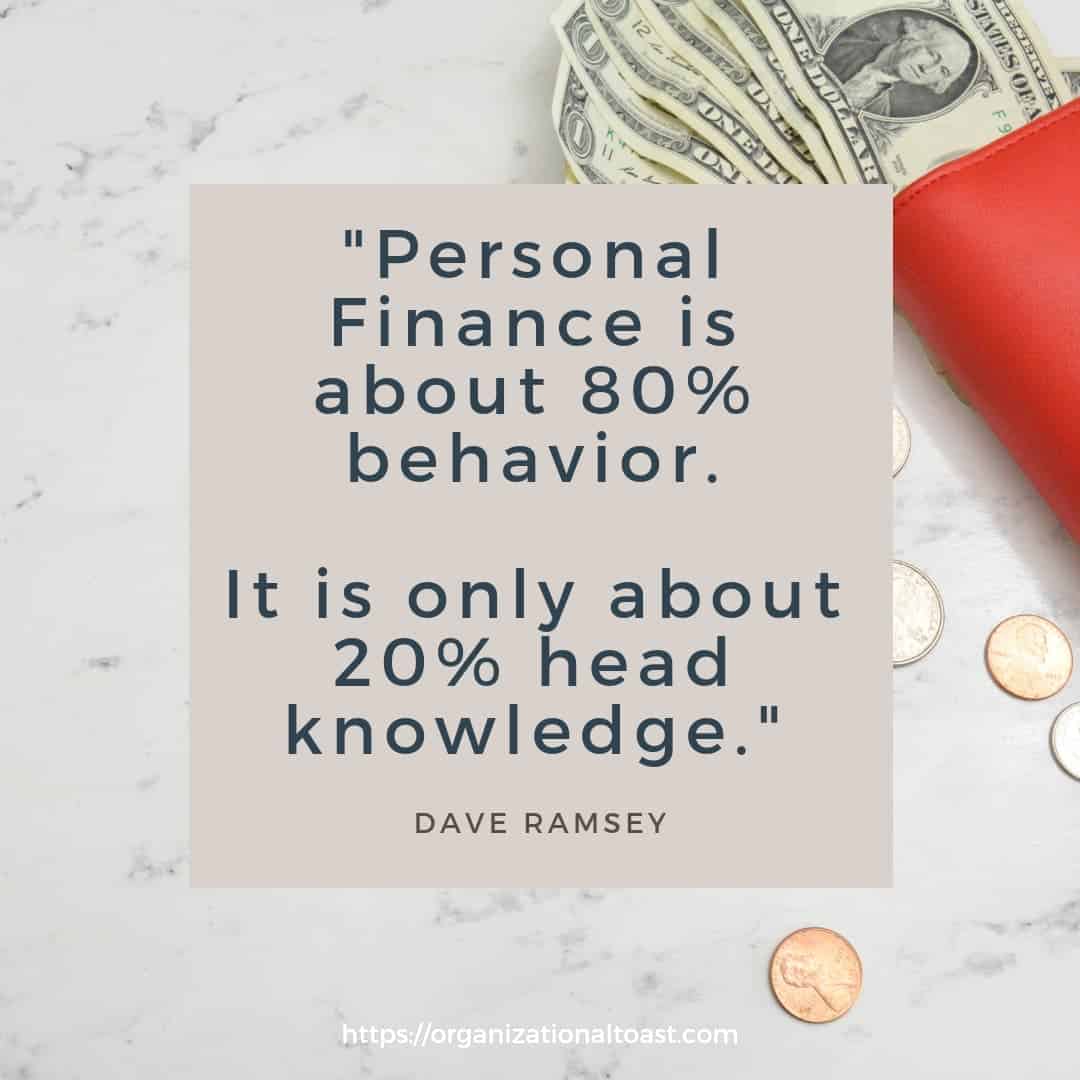Sharing is caring!
I am a Dave Ramsey fan.
BUT we did not follow all of his advice when we were paying down debt. Instead, we only adapted some of what is outlined in his 7 Baby Steps.
Sure, many people follow Dave Ramsey’s Baby Steps exactly because he breaks down personal finance in an understandable way and provides a structured road map for paying down debt and building wealth.
As much as I agree with Dave Ramsey on many points, I will tell you he is not the end all and be all of personal finance.
The truth of the matter is you don’t need someone like Dave Ramsey to tell you debt is bad. Or that you need to decrease your expenses and increase your income to reduce your debt and reach your financial goals.
When we started our debt free journey, we read Dave’s Total Money Makeover and there was a lot of it that spoke to us.
While his advice was good, we only adopted some of it and searched out additional information to build a strategy that worked for us.
Check out these 4 Best Books For Your Debt Free Journey.
Today, I’m sharing what we loved from Dave Ramsey’s Total Money Makeover and his famous Baby Steps, and the things we did differently.
Before I dive in let me be clear. We were still able to pay off $40,000 in debt on one income despite not following Dave Ramsey exactly.
Download my Getting Debt Free Tracker for your Debt Free Journey.
It’s hard to say how our debt free journey would have been different had we followed every piece of financial advice laid out in the Baby Steps to the letter, but I can say the path we took worked for our family.

What We Did Differently
We Didn’t Use A Cash Only System
One pillar of Dave Ramsey’s financial advice is the use of a cash only system. He recommends using cash envelopes to manage your money.
For every category in your budget, you add the budgeted amount of cash to that envelope. When the cash runs out in your envelope, you have run out of money for the month.
In theory, it’s a great way to curb your spending if you have a tendency to swipe away with a credit card.
When we were in the debt pay off phase of our financial journey we did not use a cash system. We did switch to debit cards and tracked our spending meticulously.
Tracking our expenditures was a little bit time consuming. I used a good ol’ fashioned spreadsheet and wrote out every dollar we spent. Honestly, with apps like Mint and Everydollar it’s easier and easier to track your spending.
Since we didn’t use a cash only system, we avoided having to split envelopes between me and hubby. We were also able to take advantage of reward features from our cards.
Now that we are debt free, we use a credit card but the expense tracking system is the same. I still track our spending for each category on a spreadsheet (it drives my husband crazy because he thinks an app can do it better) and when the money runs out in a category we know we cannot spend anymore. (This type of discipline took time to develop!)
We pay the credit card in full every month. And we’ve racked up enough points to pay for at least 2 airline tickets a year for our family vacations.
We Kept A Larger Emergency Fund
Dave Ramsey recommends a $1,000 emergency fund when you are paying down debt. At the beginning of our debt free journey we had about $5,000 in an emergency fund.
Why?
Because we were a one income family and felt that if my husband lost his job we would be out of luck.
We moved to a $1000 emergency fund when we were towards the end of our debt free journey. We felt since we were close to paying off our final debt, those extra dollars in the emergency fund would move up our pay off date and we could quickly rebuild our emergency fund. And that’s what we did.
If you don’t have an emergency fund, you need to check out the importance of an emergency fund.
We Did Not Reduce Our Retirement Contributions While Paying Off Debt
Dave Ramsey also recommends reducing other types of savings while you are paying off debt. And while I understand the reasoning, my husband and I both agreed that continuing to grow our retirement accounts was a priority.
We Continued Saving For the Kids College Accounts Before We Were Out Of Debt
This was another category we were committed to sticking with because we felt it was important. We only had one child while we were paying down our debt so the contributions were not too hefty.
What We Learned From Dave Ramsey
Personal Finance is Mostly Behavior
When it’s all said and done the only person that will get you out of debt is YOU.
You can read all the personal finance books, take all the online courses in the world but you have to do the hard work.
You have to be motivated, fired up and committed to improving your financial situation.
What Dave Ramsey did for us is he got us fired up. We got angry about our debt. We moved out of our comfort zones so we could grow and move forward.
And we learned to better decipher between a need vs. a want.
This lesson resonated with us the most and motivated us to stay committed despite the hardships and failures we experienced while paying down our debt.

Saving
We learned the importance of saving for expected expenses using sinking funds.
A sinking fund is a small savings you build up for an expected expense such as Christmas or routine car maintenance.
By putting aside a small amount each month, when the expense came along we were prepared to pay cash for that expense. We also already had a budget in mind for that spending.
This method made us more thoughtful of our purchases and forced us to plan better and consider these irregular expenses that always seemed to “surprise” us.
Related: 31 Simple Ways To Save Money Each Month
Debt Snowball
We used the debt snowball method and it was amazing.
Essentially, you work towards paying of your smallest debt first. Once you pay off that debt, you apply that monthly payment to the next debt. Each time you pay off a debt in full, you add that debt’s monthly payment to the next and larger debt.
When our first debt was paid off it felt so incredible. It was $1,600 for furniture we had purchased and the monthly payment was something like $25. It wasn’t much but it was an incredible motivator. Being able to take that $25 a month and make a principal payment on our car loan was so exciting.
Related: The Easiest Way To Make A Monthly Budget
Final Thoughts….
As with any journey you embark on, you need to do what works for you. I know many people who followed Dave Ramsey and were very successful.
I also know many who disagree with Dave Ramsey but have been successful in paying down debt.
The most important thing is to be open to making changes if you aren’t reaching your financial goals or if you continue to have issues with overspending.
Remember, only you can get yourself out of debt.
If you’re just getting started with budgeting or working towards becoming debt free and are looking to learn more about how to create a solid financial plan, you can check out this free Personal & Family Financial Planning course from Coursera.





21 thoughts on “Dave Ramsey Baby Steps: 4 Things We Did Differently”
This is helpful! I love Dave Ramsey’s teachings and I’ve also learned a lot from him. I appreciate you sharing what you did a little differently. There isn’t just one way to be successful. 🙂 It’s always helpful to read others’ stories!
Thanks Mandy. I agree!
The key is you take the advice and apply it to fit your need.
Exactly!
Thanks for sharing. It’s great that you were able to take some of his tips and make them work for you. I don’t have a credit card either…just a debit card, which is still kind of like having cash. LOL
-Lauren
It’s true. The debit card makes it easier to just swipe rather than using a cash envelope system, but still helps keep us in check!
Although I am a fan of Dave Ramsey’s FPU and teach it to others, I also know that finding a budgeting and debt elimination system that works for you and that you will commit to is what’s most important. It is so awesome that you were able to do that and share your journey with others.
Thanks Ayanna. I still really love Dave Ramsey but everybody’s journey is different. I wanted to show others that the advice Dave Ramsey shares is not all or nothing!
Keeping my home cleared of clutter is a way to save and make money. I don’t buy home decor unless I really love the item. There is less to clean and dust, and selling things that aren’t necessary or needed is a great way to make extra cash!
That’s a great tip!
We are also DR fans and didn’t follow each step exactly. Like you, we didn’t use cash envelopes and have our own way of tracking. I love how y po u dont have to follow it exactly to still get financial freedom!
I think that’s why Dave Ramsey is so popular. His advice is still useful even if you don’t follow it exactly.
SUCH good advice. Thank you for reminding me that I don’t have to do things 100% his way to apply the principles. We’ve never been good at doing cash only and the idea of not saving for retirement while paying off debt seems kinda crazy. It’s so good to know that I don’t have to do those things to be successful!
Thanks Bailey! I think lots of people have been successful without following Dave Ramsey exactly!
I have never read any of Dave Ramsey’s material but have heard so much about his practical helps for families. I like how you applied his principles but personalized things to work for your family. Everyone doesn’t fit into the same mold, so it’s great you took that into consideration.
We also execute those 4 things as well! I didn’t know there is a term “sinking fund”. We are firm believers of using a sinking fund. Thanks for a great post.
Thanks Minda! Sinking funds were a totally new concept to us before Dave Ramsey. It seems so silly now that we didn’t plan our purchases that way but it was a huge break through for us!
HI Jill, how does staying on budget work when you get paid weekly?
Hi Tina! Good question. I would recommend budgeting by paycheck (this is the budgeting method I use). I have a monthly calendar that shows all the due dates for my bills and I calculate my month’s income and my month’s expenses. Then, I break down those income and expenses to weeks. For example, from the 1st -7th I may have a mortgage payment, car insurance and cell phone bill due. I’ll budget for groceries, gas and any other expenses I have for the week. I’ll subtract the total expenses from my income. Any leftover will either carry over to cover the next weeks expenses or will be added to savings. For our family, we have weeks where there are more bills due than others, so sometimes we use this carry over method to cover expenses. I have a free budget worksheet you can download that breaks out expenses/income weekly that I think would really help you! You can download it here.
Haha, I didn’t even know I was making a sinking fund. We call it a Christmas club or a vacation fund. It’s good to know “new” terminology. : ) I Love Chis Hogan, who is a part of the Dave Ramsey Team. Glad to know that when I do not follow their plan completely that I am not alone. Thank you for sharing.
Great work! A lot of what Dave Ramsey and his team teach are really simple core techniques that we’ve sometimes lost because of our debt culture. As with any expert, it’s always so important to take the advice and make it work for your situation!